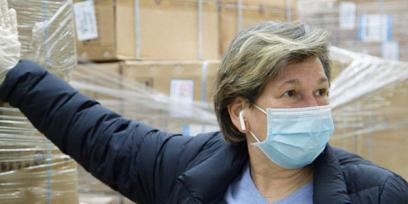Since the pandemic began, thousands of AFT healthcare members have worked tirelessly to care for COVID-19 patients, too many at the cost of their own lives. On July 28, AFT President Randi Weingarten led a special AFT convention panel of nurses sharing their experiences from the frontlines. Their first point: COVID-19 is no “slightly worse version” of the seasonal flu.
“The thing that shocked me and a lot of my colleagues is how quickly people who come in go from having a cough, some fever, [to]—in three or four hours, in front of your eyes—needing to be on a ventilator. These are, many of them, healthy people,” said Julia Barcott, an intensive care unit nurse at Astria Toppenish Hospital in Toppenish, Wash., and a Washington State Nurses Association member.
Nora Higgins, a neonatal ICU nurse at Stony Brook University Hospital and a longtime union activist with the New York State Public Employees Federation, volunteers one day a week on the COVID-19 ICU at her hospital. She said, “The chest X-rays on the patients looked like, literally, someone had crumbled crushed glass and sprinkled it into their lungs. I have never seen an X-ray look anything like that before.”
Ohio Nurses Association member Jacinta Tucker is an ICU nurse at Cleveland Clinic Union Hospital, a community hospital in rural Eastern Ohio. “People are not taking it seriously. In my area, they think wearing a mask is violating your rights,” Tucker said. She has seen 25- and 30-year-old patients who were walking one moment, “and yes, they were on oxygen, but in a day or two they were on a ventilator because their oxygen kept dropping and there was nothing you could do about it.”
Crystal Wright is a public health nurse with the Baltimore County Health Department and a member of the Baltimore County Federation of Public Health Nurses. Wright was one of a handful of nurses who volunteered early on to do COVID-19 testing in the field. “What surprised me was the amount of gratitude,” Wright says. “People would come, roll down their [car] windows [to be tested], and they would be incredibly frightened, and they would say ‘thank you.’ … When you got that ‘thank you,’ it gave you the energy you needed to push through that day and get up the next day and do it all over again.”
Progressive care nurse and Oregon Nurses Association member Jacqueline Dillon recently lost her first patient to COVID-19, a 54-year-old man. “Dealing with the death of a patient is always hard, but when you see people on ventilators fighting for their lives, and [then] you go into the world and see people saying this is a hoax?”
Barcott’s hospital is on the Yakima Indian Reservation and also serves immigrants working in nearby meat plants and orchards. She reported (in offline interviews with the AFT) that “One orchard manager told employees, ‘You’re outside, you don’t need a mask or even a bandana.’ Guess where the next outbreak was?”
Barcott said, “Racism is a public health issue. We’ve seen a huge growth in cases among people of color, and many are no longer with us. Diabetes, untreated high blood pressure, those are all risk factors. These are the people who are dying. This is why we should have preventive care for everyone.”
The panelists described how frontline healthcare workers have struggled with a lack of lifesaving personal protective equipment, a crisis the Trump administration has fallen far short on—failing, for example, to deploy the Defense Production Act to ramp up PPE manufacturing.
Higgins said, “As nurses, we felt frightened and betrayed that management didn’t have our back. You’d be told, here’s your N95 for the month, and it says right on the box, one use only.”
The AFT swung into action, negotiating equipment purchases around the world and ultimately buying a total of nearly $3 million in PPE, which is being distributed to facilities across the country. (The New York State United Teachers partnered in the purchase.)
“It was a great sense of relief” to get this PPE, Higgins said. “It really made us feel that we were cared about, that you guys had our back. It was timely and wonderful and [gave us] a renewed faith in unions as well.”
Weingarten asked the panelists what COVID-19 means for national leadership.
Wright said, “This president has left the whole medical community, the frontline workers in particular, disheartened and demoralized. To watch him divide us as a nation during a time when he should be bringing us together, … [and] disregarding top public health experts like Dr. Fauci and the scientific evidence that proves that, just by wearing a mask, you can curtail the transmission of this virus. The president has made a mask a political statement. … We need a leader who is not afraid to listen to people who are smarter than he is and listen to scientific evidence.”
Weingarten, whose sister is an intensive care physician, told panelists before the session started, “There’s nothing we can do to say thank you enough or honor you enough. Keeping you safe and protected, that is my moral commitment. I won’t stop at anything to help you.”
As the surge continues, Americans wonder what we can do. Wright has some advice: First, “A different [presidential] administration would definitely prove to be a benefit to all of us, because they would be bringing us together, they would be looking at the scientific data.” She adds, holding up a mask fresh from the laundry, “I’m not wearing this mask for me, I’m wearing it for someone else, and someone else would be doing the same for me. The most patriotic thing someone could do at this moment is to wear a mask.”


